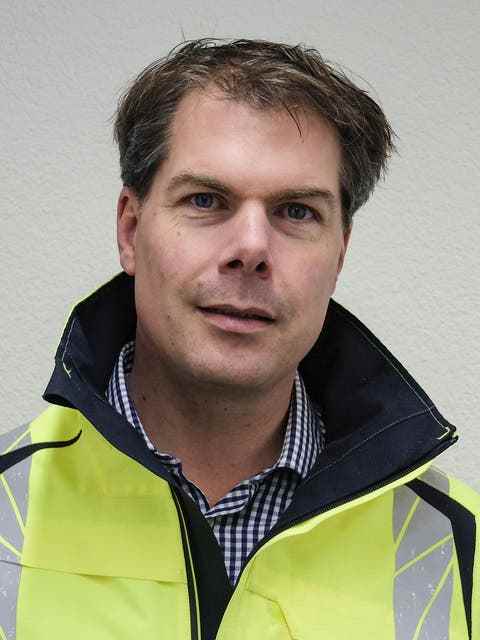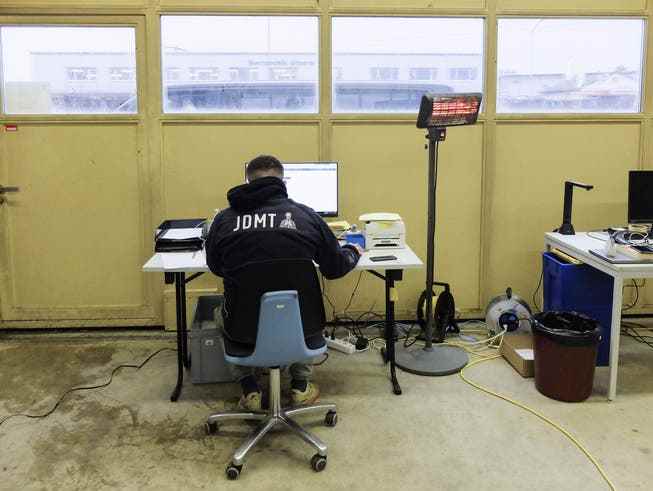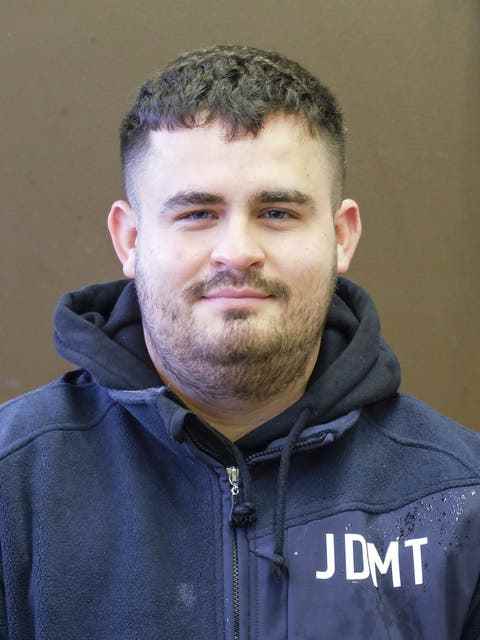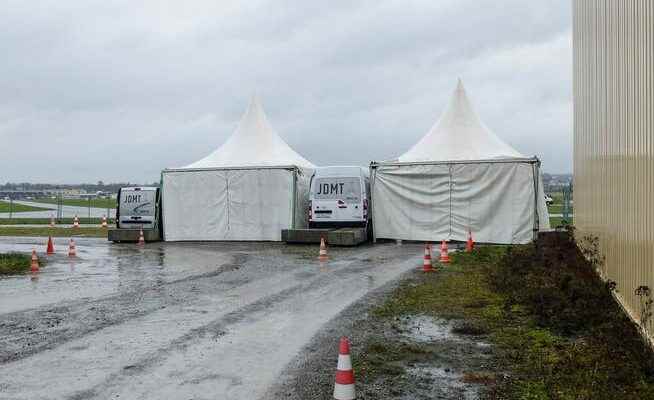As of January 1, PCR tests will no longer be paid for by the federal government. That is why a number of test centers in the canton of Zurich are closing. Some feel overwhelmed by the decision of the Federal Council.
Offer reduced to the essentials: The drive-in test center in the Airforce Center in Dübendorf will be dismantled.
A car pulls up in the rain. Tim Peter jumps up from his office chair and goes through the door outside. Shortly thereafter, he returns to the warehouse and sits down at the computer.
“What can I do to the lady or gentleman?” his colleague Niclas Burkardt asks while he puts on the blue protective gloves.
“PCR for her,” Peter replies, “and a spit test for the kid.”
Through the open side window, the woman at the wheel of the family van reports a sore throat and a headache. The father-in-law asked for a PCR test for the joint Christmas party. She always drove here to be tested, to the drive-in test center in the Air Force Center in Dübendorf. “It’s not only convenient, it’s also safer than a pharmacy or doctor’s office; there you inevitably come into contact with other people,” she says.
It is December 23, shortly after 3 p.m., the penultimate day of operation. It was almost exactly a year ago that up to 1,200 people who wanted to test were processed at the same location every day. To this end, a number of tents had been pitched on the runway of the former military airfield and staff recruited for 50 to 60 full-time positions: traffic service, welcome desk, IT support, communication with the BAG and laboratory, courier service and, last but not least, the specialists who insert the chopsticks into the nostrils.
“It was a huge exercise,” recalls Andreas Juchli. He is Managing Director of JDMT Medical Services AG, which operates the test center. The various steps of the process had to mesh seamlessly to handle the onslaught.
Activities have now been reduced to the bare essentials. The tents are no longer used. Instead, it has moved to a warehouse shared with several rows of stacked frame pallets where historical army material stands the test of time. It smells of lubricants and gun steel.
Demand no longer covers the costs
Only two men keep the test running here: Tim Peter and Niclas Burkardt. They each have a table with a computer for their use. The test materials are ready on another table. Also important is the reddish shimmering radiant heater, which Burkardt – a final year medical student – often uses to warm his clammy hands. He has taken 17 throat swabs since 8am. In addition, 14 antigen tests and 3 PCR saliva samples.
“There is still a demand,” explains his boss, Andreas Juchli. “For two months, however, it has been too small to cover the costs.”

Andreas Juchli, Managing Director of JMDT.
There were also lulls in earlier phases of the pandemic. Nevertheless, Juchli has so far refrained from completely stopping testing – for two reasons: Firstly, JDMT had to fulfill a performance mandate from the canton. You had to make sure that anyone who wanted it could get a test at any time. On the other hand, Juchli didn’t just see his business as a business. Rather, he saw it as a public health measure that benefited the community.
However, he no longer expects an upswing, because during the winter session the federal parliament in Bern passed a decision with far-reaching consequences: From the New Year, the federal government will no longer bear the costs of the tests as before. If demand was already low before, it is now likely to collapse completely.
“If it hadn’t happened like that, we would have continued until the end of March,” says Juchli. That way one would have had time to observe what Covid is doing over the winter. A flu and a Covid-19 wave are looming at the same time. In addition, no one knows whether a new variant from China will soon be spilling over. After the abrupt end of the zero Covid strategy, the country was overtaken by a veritable tsunami of diseases. A quarter billion people are said to be infected at the same time.
Many hospitals are closing facilities
Juchli, who sits on the cantonal council for the FDP, accepts the political decision. “Something like this belongs in business contingency planning,” he comments laconically. However, he admits that a little more lead time would have been nice in order to comply with the ordinary notice periods.
Its test center is by no means the only one that is closing its doors these days: the Kantonsspital Winterthur (KSW) is not only closing its in-house test center, but also the one on the Rieter site in Töss. The Uster and Affoltern hospitals are closing their respective facilities in equal measure. Likewise the Hirslanden clinic.
When asked, the media spokesman for the KSW, Thomas Meier, explained that the decision of the federal parliament came somewhat suddenly. Despite significantly lower demand, the closure of the test centers was not actually planned. At KSW, it was expected that the test costs would be covered at least until the end of winter.

Only two men maintain the test operation here. They each have a table with a computer for their use.
Ulrika Axius, head of the Test-and-go test center on Zurich’s Sihlamtstrasse, makes a similar statement. Because fewer and fewer people showed up for testing, she had reduced the staff to a minimum some time ago. Nevertheless, the federal government’s decision to no longer cover the costs took them by surprise. “I had expected the regime to continue at least until the end of March. That would have allowed for a reasonable termination of the deal.”
Their test center had also experienced periods of lower demand. “During the bad phases, we tapped into our reserves and persevered. We were always on the frontline, even at the beginning of the pandemic, when there were no vaccinations and little was known about the dangers of Covid. I would have wished for better planning and communication on the part of the federal government.”
Despite this, Axius does not intend to close their center immediately. She wants to hold out for a while to see how the situation develops. “Test centers are an important service for society,” she says.
Her customers include people who are not comfortable with the self-tests. Her staff is often available to advise customers beyond the actual testing. Insecure, often older people can be taken away from the fear. Still others would be required by their employers to produce PCR tests if they were unable to work due to illness. In addition, many foreigners are among those who appreciate their offer.
However, the Health Department of the Canton of Zurich cannot provide precise information about the total number of closures at this time. Media spokesman Jérôme Weber expects that “some” test centers will stop operating as a result of the canceled cost assumption. Tests in general practitioners’ practices and pharmacies remain possible. According to Weber, these are now responsible for the lion’s share of the test volume anyway. You have to pay out of your own pocket, unless the test is ordered by a doctor.
Test centers no longer service providers
In this context, however, Juchli draws attention to one detail: According to a letter that has just arrived, his test center (if it were to continue to exist) would no longer be able to bill for the compulsory health insurance from January 1st. The relevant subsidiary of the Santésuisse Group will withdraw the number required for this in the so-called paying agent register, which was issued as part of the Covid-19 Ordinance. Reason: Test centers are not listed as service providers in the health insurance ordinance that is now in force.
“I suspect that almost all test centers feel the same way,” says Juchli. As a consequence, this means nothing other than that the affected test centers are no longer allowed to bill for the tests ordered by the doctor. In addition, from the new year onwards they will have to issue their own invoices – no longer via the health insurance companies as before.
“That increases the administrative effort immensely,” says Juchli. “It’s simply impossible to continue working like this.”
Nevertheless, he is certain that the federal government and the cantons will not revert to the pre-pandemic state. JDMT’s various medical services would still be needed. We are still available for tests in companies and at events. In addition, the accumulated experience of almost three years of the pandemic could be used in other areas: when monkeypox spread in Switzerland, JDMT did 40 percent of the contact tracing. And recently the company won a tender for corona contact tracing in the canton of Zurich, which was limited until March.

Tim Peter found his work in the test center fulfilling.
A special period of time is ending for Niclas Burkardt and Tim Peter. The former had repeatedly reported for missions after the outbreak of the pandemic – at the beginning, when little was known about Covid, with a mixture of fear and the feeling of being there live while history is being made. “The mood in the team was always good,” he says, “but compared to the stress at the time, it’s almost wellness here.”
Peter also draws a positive balance. A year ago he started in contact tracing. Now he takes over the administrative part of testing. In complete contrast to his previous job as a logistician, he was happy to come to work every day: “I had the feeling that I was doing something meaningful. I was able to gain a lot of experience and make numerous friends.» Now he would like to continue his education as a clerk.
SP and AL are demanding free tests from the city of Zurich
bye. The pandemic is developing into an endemic. As a result, the population will have to bear the costs for corona tests themselves from 2023. The Council of States decided on December 8th. A PCR test for adults costs between 120 and 150 francs, and a rapid antigen test will cost around 40 francs from the new year. Only tests ordered by a doctor can be billed to the health insurance company. If you want to be tested in the future, you should think twice because of the prices.
The decision to abolish the free tests caused criticism in the Zurich city parliament. The SP councilor Anna Graff and her colleague from the AL, Andreas Kirstein, complain that this means that one of the last measures that would have helped to contain the virus will no longer apply. The low-threshold offer ensured that many people suspected of having a corona infection had themselves tested. In particular, with the abolition of the free tests, an increased burden on health workers is accepted.
The two have therefore submitted a postulate. They call on the city council to offer free PCR tests and rapid antigen tests to the population “as soon as possible” at several locations in the city of Zurich. These are intended to benefit in particular symptomatic people or those in close contact with people at risk.
